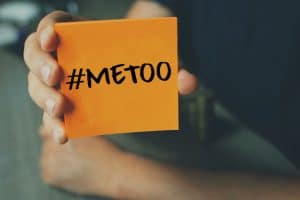The #MeToo Movement
One of the biggest revelations of the #MeToo movement was how alleged sexual harassers often used non-disclosure clauses to continue to target additional victims, who were often their employees or subordinates at work. Because their victims were prohibited from speaking out about what happened to them, others did not know that their abusers had a pattern of sexual harassment. This made it more difficult to speak up, get justice — and to stop the harassment.
Non-disclosure clauses are standard in many settlement agreements. According to a seasoned employment attorney, they essentially state that in exchange for a settlement, the parties agree to not talk about the subject of a legal claim. In a sexual harassment case, this generally means that the victim can’t warn others or give them evidence that the perpetrator has done this before. While non-disclosure agreements do make companies more likely to settle a claim — the ability to main confidentiality is a big incentive — they can have a negative impact on the well-being of employees. This is particularly true when the company does not take action to address the underlying situation, and the harassing executive or employee is allowed to continue his or her behavior.
After the #MeToo movement exploded in fall 2017, there have been significant changes in how allegations of sexual harassment are handled. Lawmakers at both the state and federal level have taken notice — and are passing laws designed to protect victims of sexual harassment. According to a recent Associated Press article, sixteen states introduced legislation in 2018 designed to restrict the use of non-disclosure agreements in sexual harassment lawsuits involving private employers. These bills were signed into law in six states, including Arizona, Maryland, New York, Tennessee, Vermont, and Washington.
In California, two separate bills were sent to Governor Jerry Brown recently. One would forbid employers from requiring non-disclosure agreements related to sexual misconduct as a condition of either getting or keeping a job. The second bill would ban settlements in sexual harassment or discrimination cases that seek to keep the circumstances of the claim secret. This law would apply to the private sector as well as to the government and Legislature.
While these laws seem promising, it is unclear what their long-term effect will be. In some cases, employers may not want to settle sexual harassment cases without the ability to keep them confidential — forcing victims to go through the expensive and time-consuming process of a lawsuit and trial. However, this challenge may be outweighed by the fact that victims will now be able to come together to share facts and information — and companies will have greater incentive to (1) prevent workplace sexual harassment and (2) deal with sexual harassers in an appropriate manner.
At PLBH, we are advocate for our clients’ interests and help them seek justice. If you have suffered workplace harassment of any kind, we are here for you. Contact us at (800) 435-7542 or info@plblaw.com to schedule an appointment and learn more about how we can help.

